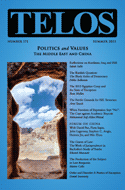Cary Nelson and Telos editor, Russell Berman, respond to Saree Makdisi and raise broader questions about the contemporary humanities. Read their essay at Fathom.
|
Debates about the status of academic freedom in Israel, Gaza, and the West Bank have for years focused almost exclusively on claims about the negative impact particular Israeli government and Israeli Defense Force (IDF) policies and practices have had on Palestinian students and faculty. Largely ignored, especially as the Boycott, Divestment, and Sanctions movement (BDS) levels accusations against Israel and promotes boycott and divestment resolutions directed against the Jewish state, has been the broader character of academic freedom on Palestinian campuses. Indeed there is little evidence that most students and faculty in the West know what the major threats to academic freedom in Gaza and the West Bank are, let alone who is responsible for carrying them out. I was invited to speak on this panel, having been reassured that it would be devoted to academic boycotts in general, but I cannot say that I was surprised to discover that half of the titles here advocate one and only one boycott target. I will therefore make some remarks concerning academic boycotts in general, to which I object on principle, but also comment on the campaign against Israeli universities in particular. I expect that we will hear boycott proponents denounce the apartheid character of Israeli society or policies of genocide and other such mythologies that the boycott movement has disseminated and which the APA may eventually be asked to endorse. But let’s leave the propaganda for the discussion section. |
||||
|
Telos Press Publishing · PO Box 811 · Candor, NY 13743 · Phone: 212-228-6479 Privacy Policy · Data Protection Copyright © 2025 Telos Press Publishing · All Rights Reserved |
||||
 It is this article’s assertion that calls for academic boycott contradict with the classic rationales of the right to free expression and with the peculiar features of the right to academic freedom. Freedom of expression is about developing a dialogue between two opposing opinions, wherein each claims to be the right one. Calls for academic boycott promote monologues rather than dialogues, thus creating the illusion that they represent the truth because they are not challenged. Moreover, protecting the right to academic freedom of individual academics is necessary for their fulfillment as researchers who can respect academic standards exclusively rather than institutional mandates. The self-fulfillment for an individual academic is enacted through the ability to convey messages that can compete against other views.
It is this article’s assertion that calls for academic boycott contradict with the classic rationales of the right to free expression and with the peculiar features of the right to academic freedom. Freedom of expression is about developing a dialogue between two opposing opinions, wherein each claims to be the right one. Calls for academic boycott promote monologues rather than dialogues, thus creating the illusion that they represent the truth because they are not challenged. Moreover, protecting the right to academic freedom of individual academics is necessary for their fulfillment as researchers who can respect academic standards exclusively rather than institutional mandates. The self-fulfillment for an individual academic is enacted through the ability to convey messages that can compete against other views. 

